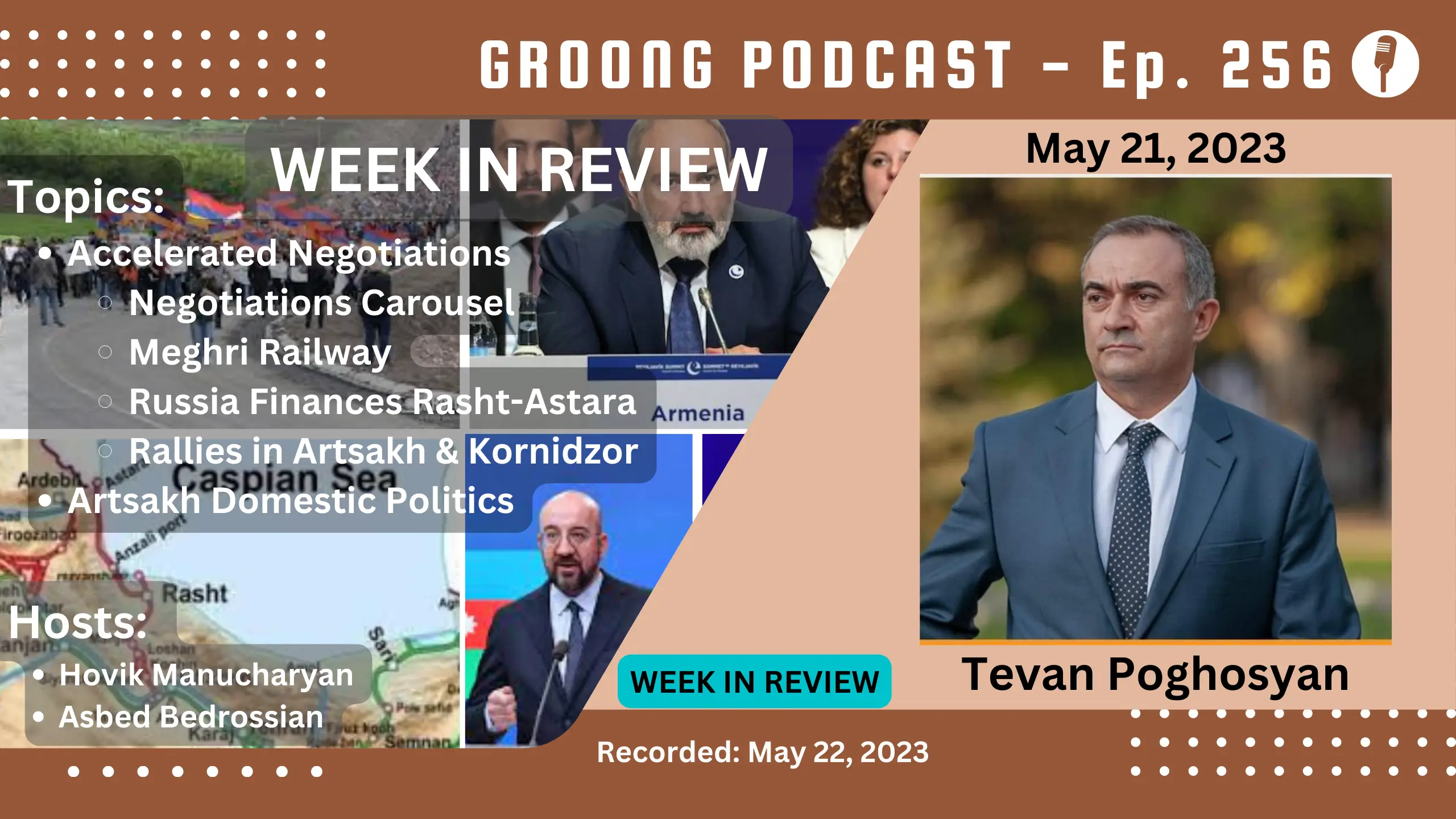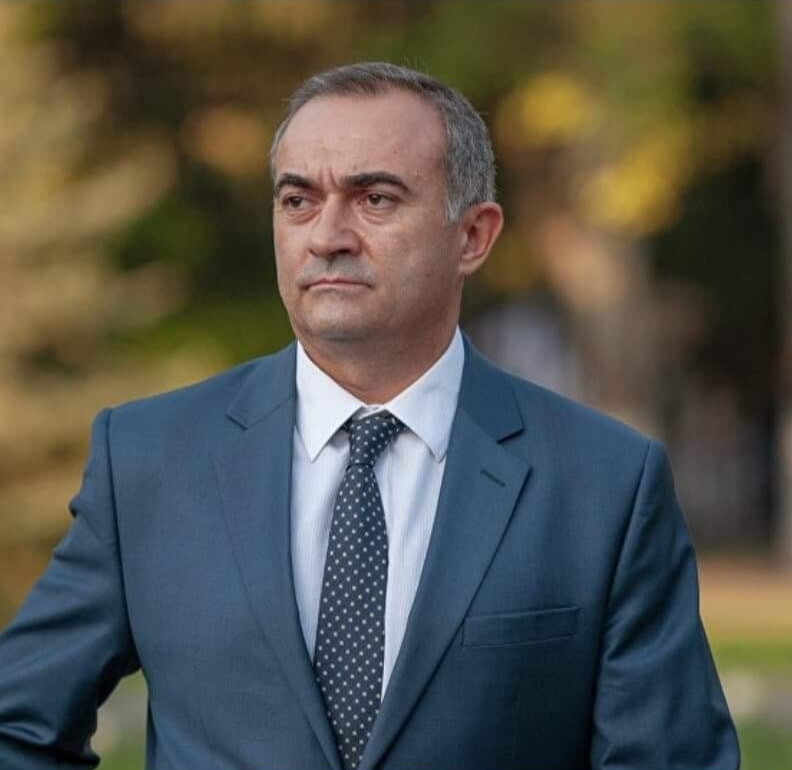
Guest:
Topics:
- Accelerated Negotiations
- Negotiations Carousel
- Meghri Railway
- Russia Finances Rasht-Astara
- Rallies in Artsakh and Kornidzor
- Artsakh Domestic Politics
Episode 256 | Recorded: May 22, 2023
Show Notes
Accelerated Negotiations
After several weeks of accelerated negotiations in various capitals of the world (some at war with each other), Nikol Pashinyan finally said what Aliyev wanted him to say.
Pashinyan said that he recognizes Artsakh as part of Azerbaijan.
After re-affirming that Azerbaijan is conducting a policy of ethnic cleansing and genocide in Artaskh, he said with a straight face that Armenia is moving closer to signing a so-called “peace deal” that hands away Artsakh and the so-called enclaves. Pashinyan said it was unlikely that the document would be signed next week in Moscow but did not exclude that it could be signed in Kishinev on June 1 or in Belgium in July.
Negotiations Carousel
In the past month there has been a flurry of activities in the arena of Armenian-Azerbaijani negotiations. To recap, less than a month ago we read that there would be a foreign ministerial meeting in Moscow, but within a couple of days of those announcements, Ararat Mirzoyan and Jeyhun Bayramov were in Washington DC, meeting bilaterally, and trilaterally with Secretary Anthony Blinken.
The week following that, Pashinyan and Aliyev met in Brussels, and Charles Michel announced that the leaders had announced mutual recognition of each others’ countries in their internationally recognized square footage.
This past weekend Mirzoyan and Bayramov were in Moscow, this time meeting under the auspices of Sergey Lavrov. And now a Pashinyan-Aliyev summit in Moscow is announced on May 25.
There are even more meetings, some as early as June 1, in Kishinev, and then Brussels later in the summer, then Granada in the fall.
Questions:
- What are we getting for all this platform-hopping?
- To many observers the “86,600 sq.km.” language has been code for Pashinyan telling Aliyev “Artsakh is Azerbaijan”. Is there any room for doubt now that Pashinyan has effectively sold Artsakh down the river, by recognizing Azerbaijan’s 86,600 sq.km. territorial space?
- Where do we go from here?
There appear to be some serious gaps between the Russian and Western platforms trying to broker this so-called “peace” in the South Caucasus.
Lavrov previously said in an interview that the west is trying to wrest Armenia away from Russia. While Mirzoyan was in Moscow last week, Lavrov stipulated that Russia has paramount interests in the South Caucasus and said he’s “certain” that Russia’s allies understand that.
Today, Pashinyan, while denying Lavrov’s assertion, stated that leaving CSTO is not out of the Armenian agenda and that CSTO membership has been a liability in Armenia’s procurement of weapons.
We have discussed that the interest of the West in the so-called peace between Armenia and Azerbaijan is primarily to displace Russia from the South Caucasus. Russia is at war with the West, so it seems there’s a competition between who will be the mediator in South Caucasus.
Questions:
- Is the intensification of the process of negotiations, where we’re seeing absolutely zero concessions on the part of Azerbaijan, in Armenia’s interests?
- How should we read these diplomatic messages from Lavrov? Was he just acknowledging a fact or are his words to be interpreted as a warning?
Meghri Railway
One of the topics mentioned out of Brussels was that there was some progress in unblocking transportation as they say “in the region”. In reality, the unblocking is only about linking Azerbaijan and Nakhichevan. We did not hear Aliyev directly say the “C” corridor” word after Brussels, so it seems like this point eluded media and political scrutiny for now while Ararat Mirzoyan claimed this to be an achievement.
Since this railway issue progress was achieved in Brussels, it’s unlikely that it would preserve the Russian FSB as an overseer of the transit process, as stipulated in the November 2020 trilateral ceasefire agreement. In fact, in the past Pashinyan has talked about mutually agreeable international organizations that could take care of customs functions on the corridor. Vahan Kerobyan explained in more detail that the company in question is a Swiss company called SGS, which has previously filled a similar role in Abkhazia.
Questions:
- What benefit will there be from this railway? Is Armenia paying hundreds of millions of dollars in order to connect Azerbaijan with Nakhijevan, without getting much in return or is there some substantial benefit that Armenia can get?
- Despite explicitly not mentioning the word “corridor”, does the involvement of a Swiss company to perform customs functions rule out the possibility of “corridor logic”?
Rasht - Astara Railway
A major geopolitical deal was signed this week between Russia and Iran. Russia will provide $1.6 billion financing to build a 160 km railway inside Iran connecting Rasht on the Caspian Sea and the Iranian city of Astara, which is on the border of Azerbaijan. This will be the last missing link to create a contiguous railway from India to Russia, through Iran and Azerbaijan. This railway is one of the components of the International North–South Transport Corridor (INSTC).
Vladimir Putin painted this as a major achievement because it would create a transport corridor that would allow for goods to be shipped from Asia to Russia and potentially Europe on land, avoiding the Suez canal. It would also be a potentially major boost to Russia as it comes under more Western sanctions. It would also be a boost to Iran who is also continuously isolated by the west.
It seems that the Rasht-Astara railway is being built bilaterally by Russia and Iran in an attempt to not involve the other major player in the project, Azerbaijan, which would be used as a conduit for the traffic due to potential for Western sanctions. However, Azerbaijan will build the last missing piece by building a short rail link connecting the Iranian city of Astara with the eponymous city in Azerbaijan, right across the border.
Armenia is also part of the INSTC, but there are only plans to build roads. However, several circumstances have slowed down the multi-billion dollar project to build adequate roads in Armenia.
Questions:
- How do you see this development in the context of Russia vs. West geopolitics?
- Is this a major geopolitical blow that will further isolate Armenia?
- What are the causes for Armenia’s slow construction of the North-South road?
- Does Armenia have a way out of this regional isolation?
Rallies in Kornidzor and Artsakh
On Saturday the 20th, over 5,000 people marched near the Armenian border near the Kornidzor bridge, to demand that the Armenian government and people wake up, and fight for its country, and remove border checkpoints between two Armenian states: Armenia and Artsakh. A similar march was conducted by opposition parties in Artsakh.
Questions:
- Hovik, you were at the rally on Saturday, can you give us a first hand report from that event?
- Tevan, what are your thoughts on how the Armenian nation and the Armenian public can take measures against the betrayal of Artsakh?
Artsakh Political Intrigue
There are political developments in Artsakh that raise concern among analysts. Meanwhile over 30 Armenian parties, alliances and organizations signed a declaration that any agreement signed by the Armenian government that recognizes Artsakh as part of Azerbaijan is illegal and no one, including Pashinyan, is unacceptable, and that Armenia has no right to speak for Artsakh.
Meanwhile, since Samvel Babayan returned to Artsakh, he has been actively holding meetings with supporters and publicly demanding that Arayik Harutyunyan appoint him as state minister. On Monday, Babayan held a rally in Stepanakert issuing similar demands; where only a few hundred people showed up; higher estimates put the count of attendees at about a thousand people.
Despite the weak turnout, however, speaker of the Artsakh parliament, Arthur Tovmasyan, in response to Babayan’s demands, called on president Arayik Harutyunyan, to either resign or call for a referendum of confidence on himself, and asked to set up a state defense commission including Rouben Vardanyan and Samvel Babayan.
Samvel Babayan accepted Tovmasyan’s call, saying he’d agree to rule Artsakh as part of a “State Defense Commission”. Rouben Vardanyan on the other hand politely declined, saying it is not the time.
Also, Rouben Vardanyan, after stepping down from being state minister, has created a new platform to continue struggling for Artsakh, called the Front for the Security and Development of Nagorno Karabakh. This platform involves all political parties in Artsakh.
Questions:
- Hows should we analysis of the various movements in the politics of Artsakh Republic, as well as the various protests and rallies? Is it really the time for infighting?
- Why would Artsakh speaker Arthur Tovmasyan demand Arayik Harutyunyan’s resignation at this moment in time? What prompted this? And how realistic is the potential for Arayik’s resignation.
- What would a State Defense Commission do?
Wrap-up
We hope you found our Week in Review helpful. We invite your feedback and your suggestions. You can find us on most social media and podcast platforms. Thanks to Laura Osborn for the music on our podcasts.
Guests

Tevan Poghosyan
Tevan Poghosyan is president of the International Center for Human Development. Mr. Poghosyan was an MP in the National Assembly between 2012 and 2017 from the Heritage party. From 1997 to 1999 he served as the Nagorno-Karabakh Public Affairs Office Director in Washington, D.C.
Hosts

Hovik Manucharyan
Hovik Manucharyan is an information security engineer who moved from Seattle to Armenia in 2022. He co-founded the ANN/Groong podcast in 2020 and has been a contributor to Groong News since the late 1990s.
Disclaimer: The views expressed by Hovik Manucharyan on the ANN/Groong podcast are his own and do not necessarily reflect the opinions of his employer or any other organization.

Asbed Bedrossian
Asbed is founder of the Armenian News Network Groong and co-founder of the ANN/Groong podcast.